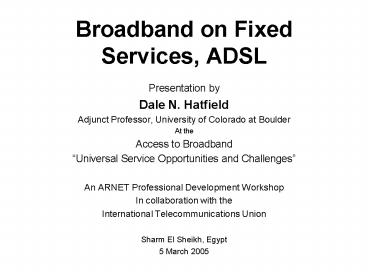Broadband on Fixed Services, ADSL - PowerPoint PPT Presentation
1 / 22
Title:
Broadband on Fixed Services, ADSL
Description:
Opportunities and Challenges for DSL Technology in Achieving Universal Service ... Number of DSL lines worldwide on the order of 100 million at EOY 2004; ... – PowerPoint PPT presentation
Number of Views:57
Avg rating:3.0/5.0
Title: Broadband on Fixed Services, ADSL
1
Broadband on Fixed Services, ADSL
- Presentation by
- Dale N. Hatfield
- Adjunct Professor, University of Colorado at
Boulder - At the
- Access to Broadband
- Universal Service Opportunities and Challenges
- An ARNET Professional Development Workshop
- In collaboration with the
- International Telecommunications Union
- Sharm El Sheikh, Egypt
- 5 March 2005
2
Outline
- Background and Introduction
- Digital Subscriber Line (DSL) Technology
- DSL Position in the Broadband Market
- Opportunities and Challenges for DSL Technology
in Achieving Universal Service - Selected Policy Issues Relating to DSL
- Summary and Conclusions
3
Background and Introduction
- Notion of Bandwidth (Review)
- In simple terms, bandwidth is an analog concept
which refers to the range of signal frequencies
that a circuit (channel) will pass - The larger the bandwidth, the more information
that can be transmitted in a given amount of time - In the digital world, bandwidth is measured in
bits per second - Analogous measures vehicles per hour or liters
per minute
4
Background and Introduction
- Notion of Bandwidth (Review)
Computer Monitor
Illustration of the Importance of Bandwidth
5
Background and Introduction
- Bandwidth of Different Transmission Media
- Twisted-pair copper cable
- Coaxial cable
- Fiber optic cable
- Radio
6
Background and Introduction
- Applications and Required Bit-rates
Application Bit-rate Required
VoIP 16 kbps
Full screen video conferencing (H.263) 384 kbps
Basic web browsing 1 Mbps
5 Mpixel JPEG photo in 10 seconds 1.5 Mbps
SDTV (MPEG2) 4 Mbps
SDTV (MPEG4) 1.5 Mbps
HDTV (MPEG2) 15 Mbps
HDTV (MPEG4) 7 to 9 Mbps
Uncompressed medical X-ray in 2.5 seconds 25 Mbps
Source Adopted from DSL Forum rates include
overhead
7
Background and Introduction
- The Traditional Local Telephone Network
8
DSL Technology
- Asymmetrical DSL (ADSL) Systems (Notional)
Frequency Response or Bandwidth Of the Local
Loop
Existing Telephone Service
Amplitude
Downstream Channel To Residence/Business
Upstream Channel To Network
4 30
Frequency (kHz)
9
DSL Technology
- Varieties of DSL
- Asymmetrical Digital Subscriber Line - ADSL
- High bit-rate Digital Subscriber Line - HDSL
- Single-pair HDSL SHDSL
- Very high bit-rate DSL - VDSL
- Others
10
DSL Technology
- ADSL
Voice Voice Band Data
Analog Voice
Analog Voice
Circuit Switch
Splitter
DSLAM
Splitter
Data
Data
Residence
Data to ISP or Corporate Network
Central Office
DSLAMDigital Subscriber Line Access Multiplexer
11
DSL Technology
- Unbundled Loop with ADSL
ILEC Central Office
Loop
PSTN
Splitter
Splitter
ISP/Internet
DSLAM
Unbundled Loop with ADSL
MX
CLEC Network
Unbundled Loop
12
DSL Technology
- ADSL bit-rates
- Up to 8 Mbps downstream over 2 km of copper
wires longer lengths less (e.g., 384 kbps
downstream at 5.5 km) - Typical offerings 1.5 Mbps down and 384 kbps up
or 3.0 Mbps down and 768 kbps up - ADLS2 bit-rates up to 20 Mbps
- VDSL2 bit-rates up to 50 Mbps
13
DSL Position in the Worldwide Market
- Notes
- Number of DSL lines worldwide on the order of 100
million at EOY 2004 growing rapidly - In the US, DSL to cable modem service is about
12 but recently, in terms of new lines,
competition is about even - Even better success in many other markets
technological characteristics of existing network
have an important influence on the speed of
rollout
14
DSL Position in the Worldwide Market
No. of Lines in 1,000s
1999 2000 2001 2002
2003 2004(3rdQtr)
Source DSL Forum and Point Topic
15
ADSL Position in the Broadband Market
- Percentage DSL Subscribers by Region
Source DSL Forum and Point Topic
16
ADSL Position in the Broadband Market
17
Opportunities and Challenges for DSL Technology
in Achieving Universal Service
- Advantages
- Comparative low incremental cost over an existing
copper based telephone infrastructure - Standardization and large volumes in developed
countries drive down costs - Competition with cable company provided cable
modem service and licensed and unlicensed
wireless service drives technological advances
18
Opportunities and Challenges
- Advantages (Continued)
- Can provide convenient backhaul for WLANs and
Wireless ISPs (WISPs) in low density environments - Challenges
- May not be the technology of choice where
telephone infrastructure does not already exist - Despite rapid development, loop distance
limitations still a factor in low density
environments
19
Opportunities and Challenges
- Challenges (Continued)
- In addition to the loop length constraint,
problems may still arise depending upon loop
quality (e.g., faults) and architecture (e.g.,
presence of loading coils or Digital Loop Carrier
systems) - Very high data-rate versions (e.g., VDSL) may
require a change in architecture (e.g., FTTx)
and, hence, additional investment
20
Selected Policy Issues
- Loop Unbundling
- Price of Unbundled Loop
- Collocation and Collocation Pricing
- Loop Sharing (Different Providers for Voice and
Data on Common Loop) - DSL Service Without Voice Service on Loop
21
Summary and Conclusions
22
Contact Information
Dale N. Hatfield Adjunct Professor Interdisciplin
ary Telecommunications Program University of
Colorado at Boulder Engineering Center -
ECOT-317 Campus Box 530 Boulder, CO
80309-0530 Main Tel 1-303-492-8916 Direct Dial
1-303-492-6648 Fax 1-303-492-1112 Cell Phone
1-303-589-4546 Email dale.hatfield_at_ieee.org or
hatfield_at_spot.colorado.edu































